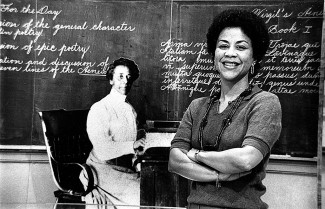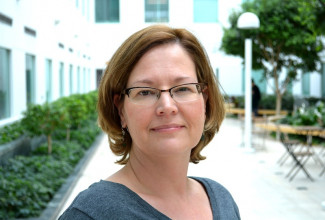
Johns Hopkins UniversityEst. 1876
America’s First Research University
What Difference Did the Nineteenth Amendment Make?

2020 marks the 100th anniversary of the granting of women's suffrage in the United States through state ratification of the Nineteenth Amendment. The Spring 2020 issue of Journal of Women's History included a Special Forum to reflect on the milestone, asking "What Difference Did the Nineteenth Amendment Make?"
The Special Forum was guest edited by Wayne State University's Liette Gidlow, who proposed, organized, and edited it. She joined four leading women's historians to write about the topic from different regional, class, and race perspectives.
We are grateful to Dr. Gidlow for taking some time to discuss the issue in more detail.
Q: How did this special issue on the 19th Amendment come about?
I had been thinking about the 19th Amendment centennial for a long time. Honestly, I was dreading the approaching anniversary. My concern was that it would be used as an occasion for national self-congratulation ("American democracy! Isn't it great?!”) when, in my view, the story of woman suffrage was much more nuanced and complicated, and not always something to celebrate. At the same time, I was frustrated with scholarly interpretations that the amendment didn't really change anything. That seemed to me to play into misogynist views that dismiss or downplay the significance of what women do and achieve, a narrative that anti-suffragists perpetuated not only before ratification but also after. It seemed to me that the 19th Amendment was due for a reassessment, especially given all the work that has come out in recent years about diverse women's engagement in civic life. What did the 19th Amendment achieve? What did it fail to deliver on? What difference did it make, not only for diverse groups of women but for political institutions and practices? It seemed to me impossible that you could do something as disruptive as enfranchise a whole class of people without it making a difference on political institutions, even if it did not make much difference in policy outcomes. I saw the need for an accounting that was balanced, intersectional, inclusive, and nuanced, and set out to find other scholars who wanted to do the same. When I approached JWH with the idea in 2017, the editors were very receptive. At the 2017 Berks I began to look for collaborators. And that’s how this terrific team came together.
Q: In your introduction, you note that while the 19th Amendment is commonly touted as a success to be celebrated, there are many historians that question the framing of that success - and whether it was a success at all. Do you feel that celebrations and commemorations do a disservice by putting rose colored glasses on a complicated, intersectional piece of history?
Well, commemoration and celebration are two different things. Commemorations are occasions for stock-taking, and the anniversary has been a very useful device for that. And while there has been considerable public interest in celebrating the Amendment, I find it useful to use that interest to encourage consumers of history to consider new perspectives and viewpoints.
Q: In light of the many issues facing this country as we approach the 2020 presidential election, how do you feel the research you've put forth on the countless efforts to suppress the Black vote in the 1920's is pointedly (and sadly) relevant today?
The disfranchisement efforts we see today that target African American voters are nothing new. Voter purges, limiting access to registration, long lines, gerrymandering -- it's all part of the old playbook that white supremacists in the South perfected at the turn of the twentieth century, though they were hardly the only practitioners. The US Supreme Court's Shelby v Holder decision in 2013 set us back to a world in which elections more closely resemble those that took place before the 1965 Voting Rights Act than after. We are seeing the perfectly predictable consequences of Shelby v Holder.

Her work has been, and is, so important to me and to so many. She showed us that African American women had visions of freedom and equality that far exceeded the imaginings of the nation's founders and political leaders. She proved that Black women could be found in the archives when others said that they could not. She was a model of the generous, committed scholar-activist and used her teaching and mentoring to make a place in the academy for people whose voices were desperately needed but who had very little access. The flowering of Black women's history we are seeing today is in part a product of her work across decades. Personally, she was very gracious to me from the moment we met at an OAH years back. As the anniversary approached, I could hardly imagine a centennial reckoning with the 19th Amendment that did not include her, and when I asked, she said "yes." I am humbled to think that her essay in this JWH collection is her last published piece of work. I made sure her daughter got a copy. The essay is a wonderful coda to a lifetime of work.
Q: What was your path to becoming a women's history historian? Was there a particular event, book, course, or teacher who inspired you?
My first class that focused on women was actually a literature class I took as an elective in college. Prof. Lauren Berlant's course on feminist literary criticism when I was an undergrad at the University of Chicago just opened up the world for me. But I was also interested in politics and public policy, and Prof. Gary Orfield gave me the chance to do research and publish on racial disparities in educational access while I was still an undergrad. I wanted a break from school after college, and went to work in Washington as a congressional staffer, first for Sen. Paul Simon and then for Rep. Julian Dixon, who chaired the Congressional Black Caucus Foundation. When I went back to school, I wanted to study both US political history and women's history. My dissertation chair at Cornell, Prof. Joel Silbey, was enormously supportive, really a model advisor who introduced me to ideas and methods just when I needed them and made the resources I needed available. Prof. Mary Beth Norton generously welcomed me into the field of women's history, even though my interests were much later than hers. And Prof. Mary Katzenstein helped me gain a grounding in American political development, social movement theory, and other topics in political science. So, politics, policy, gender, and race -- they are all long-term interests of mine, and I'm happiest working on projects when my projects let me pull all these elements together.
Q: What's next for you? Do you have a book in the works?
I'm hard at work on my third book, The Nineteenth Amendment and the Politics of Race, 1920-1970.
The project uses an intersectional lens to uncover connections between the Nineteenth Amendment of 1920 and the Black freedom movements of the 1950s and 1960s, and in this way brings into conversation two historical narratives that previously have been treated separately. Black women's voting rights activism ignited by the 19th Amendment, I argue, had enormous consequences for American politics -- for the Democratic party in the 1930s, for the civil rights movement of the 1950s and 1960s, and for the women's movement of the late 1960s and 1970s.



